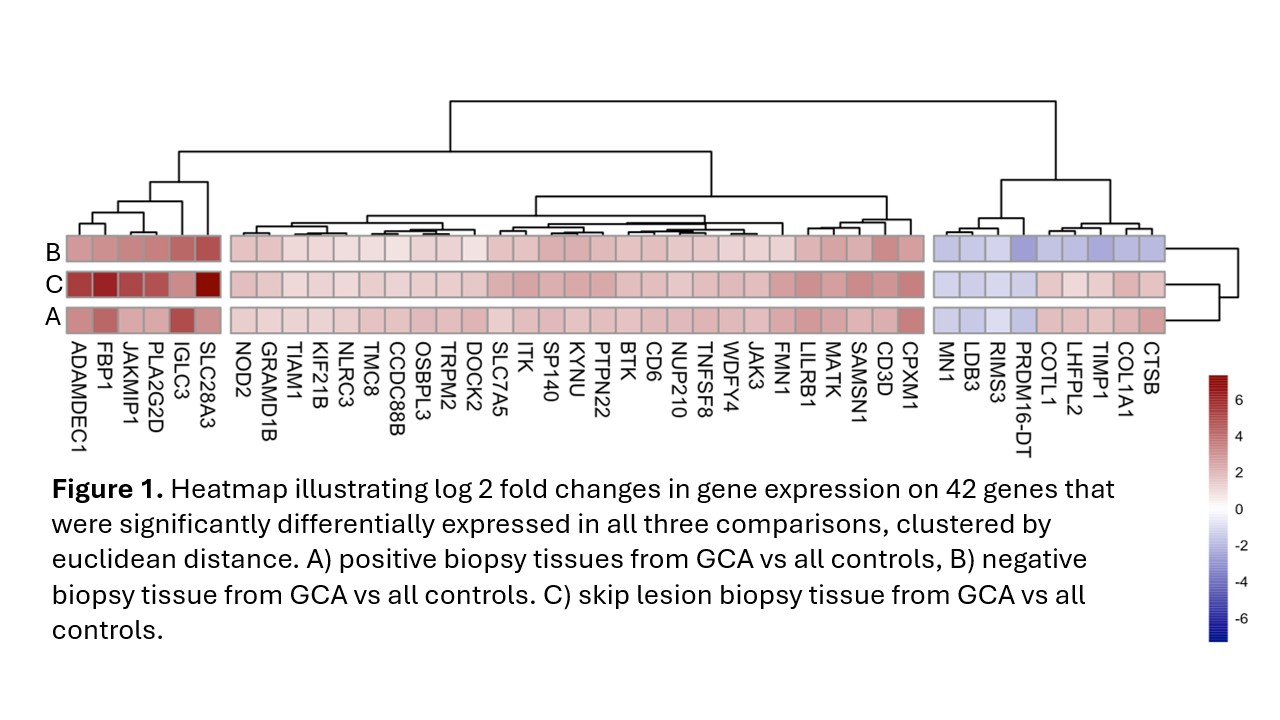Session Information
Date: Saturday, November 16, 2024
Title: Vasculitis – Non-ANCA-Associated & Related Disorders Poster I
Session Type: Poster Session A
Session Time: 10:30AM-12:30PM
Background/Purpose: Giant cell arteritis (GCA) is the most common vasculitis in people over 50 years old and is a clinical diagnosis bolstered by pathologic findings on temporal artery biopsy (TAB). However, histologically normal temporal artery (TA) tissue is commonly found in GCA cases in the form of skip lesions flanked by abnormal tissue and as normal TABs in patients with abnormal contralateral TABs. In patients with biopsy-proven GCA, we suspect that histologically normal TA tissues share key molecular features with histologically abnormal TA tissues compared to TA tissues of non-GCA controls. Identifying these similarities is critical in understanding the pathophysiology of and improving diagnostics and treatment for GCA.
Methods: To study this, we collected 51 TAB samples from patients at OHSU and the Mayo Clinic with a biopsy-proven diagnosis of GCA as well as control subjects who underwent TAB in their workup but were not ultimately diagnosed with GCA. For the samples with a biopsy-proven case of GCA (n=21), we collected three categories of TA tissues: A) GCA positive tissue (16), B) GCA negative tissue from patients with a known positive contralateral TAB (2), and C) skip lesions which were negative for GCA that were dissected from otherwise positive sections (3). Controls (n= 30) included those who were healthy (16) along with others diagnosed with polymyalgia rheumatica (3), granulomatosis with polyangiits (2), rheumatoid arthritis (1), relapsing polychondritis (1), infections (2), or atherosclerosis (6). TABs were processed via bulk RNA sequencing, aligned to the human genome and batch-effect corrected with RUVseq. Differential gene expression analysis, controlled for sex and age, was performed in edgeR with an FDR adjusted p-value of < 0.05. We explored the significantly differentially expressed genes with pathway enrichment analysis (Reactome) and the Drug-Gene Interaction Database (DGIdb).
Results: Three differential gene expression comparisons were performed in parallel, each yielding significantly differentially expressed (DE) genes: A) Positive biopsies from GCA cases vs controls (2,279 DE genes), B) negative biopsies from GCA cases vs controls (11,247 DE genes) and C) skip lesion biopsies from GCA cases vs controls (638 DE genes). Forty-two genes were found to be differentially expressed in all three comparisons (Figure 1). Pathway enrichment analysis on these 42 genes prioritized pathways in both adaptive and innate immune systems and hemostasis. Fourteen of the 42 candidate genes were reported as having an inhibitor drug in the DGIdb. Three genes (JAK3, PTPN22, CD3D) are linked to immune suppressive drugs – JAK inhibitors treat many rheumatic conditions and are currently in clinical trial for GCA, CD3D has been a target for early T1D treatment, and PTPN22 is a target of methotrexate.
Conclusion: Mirroring the paradigm that histologically normal tissue can have pathologic relevance, as seen with the lupus band test, our analysis has revealed a core of 42 genes that distinguish histologically positive and negative TABs from people with biopsy-proven GCA compared to clinically diverse controls. These genes are biologically compelling biomarker candidates and a third of them may be targetable by existing drugs.
To cite this abstract in AMA style:
Lindquist I, Choi D, Fei S, Vakil-Gilani K, Ghetie D, Wilson D, Salomao D, Stiefel H, Albert D, Rosenbaum J, Friedman M. Transcriptional Analysis of Both Normal and Abnormal TABs in Biopsy-proven GCA Reveals a Shared Gene Expression Profile Compared to Clinically Diverse Controls [abstract]. Arthritis Rheumatol. 2024; 76 (suppl 9). https://acrabstracts.org/abstract/transcriptional-analysis-of-both-normal-and-abnormal-tabs-in-biopsy-proven-gca-reveals-a-shared-gene-expression-profile-compared-to-clinically-diverse-controls/. Accessed .« Back to ACR Convergence 2024
ACR Meeting Abstracts - https://acrabstracts.org/abstract/transcriptional-analysis-of-both-normal-and-abnormal-tabs-in-biopsy-proven-gca-reveals-a-shared-gene-expression-profile-compared-to-clinically-diverse-controls/

